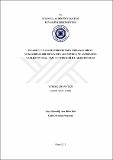DSpace Repository
İSTANBUL’UN FARKLI YERLERİNDEN TOPLANAN MİDYE VE KARİDESLERDE ROTAVİRUS, ADENOVİRUS VE ASTROVİRUS VARLIĞININ REAL-TIME PCR YÖNTEMİ İLE ARAŞTIRILMASI
JavaScript is disabled for your browser. Some features of this site may not work without it.
| dc.contributor.author | Ghalyoun, Farouk
|
|
| dc.date.accessioned | 2019-05-28T10:54:46Z | |
| dc.date.available | 2019-05-28T10:54:46Z | |
| dc.date.issued | 2017-10 | |
| dc.identifier.uri | http://hdl.handle.net/11547/2274 | |
| dc.description.abstract | Viruslar gıda vasıtasıyla en yaygın bulaşan patojenlerden biridir. Virus kontaminasyonları başlıca çevrenin atık sularla kirlenmesi vasıtasıyla meydana gelmektedir. Sebzeler, kabuklu deniz ürünleri ve çeşitli hazır yemekler gibi birçok farklı gıda maddeleri gıda kaynaklı virutik enfeksiyonlara neden olabilmektedir. Epidemiyolojik bulgulara göre insana ait enterik viruslar kabuklu deniz ürünleri vasıtasıyla en çok aktarılan etyolojik ajan olarak tanımlanmaktadır. İstanbul sahillerinde midye ve karides yoğun bir şekilde satılmakta ve çeşitli yöntemlerle pişirilerek tüketilmektedir. Bu çalışmada İstanbul’da avlanıp tüketilen midye ve karides numunelerinde, Real-time PCR yöntemi kullanılarak adeovirus, rotavirus ve astrovirus varlığı araştırılmıştır. Bu amaçla Nisan (2017) ayı içinde farklı balıkçı teknelerinden, Beylikdüzü İlçesi’nden Gürpınar Su Ürünleri Hali’nden 8 kg karides numunesi toplanmış ve 400 gramlık 20 partiye bölünmüştür. Bunun dışında, Büyükçekmece İlçesi’nden Mimarsinan Balıkçı Barnağı’ndan alınan 3,2 kg karides numunesi 400 gramlık 8 partiye bölünmüştür. Ayrıca, Nisan (2017) ayında, Beylikdüzü İlçesi’nden Gürpınar Su Ürünleri Hali’nde balıkçı teknelerinden alınan 500 midye numunesi, 25 adetlik 20 partiye bölünmüştür. Rumeli Kavağı’ndan balık satış yerlerinden 350 midye numunesi toplanmış ve 13 partiye bölünmüştür. Beyoğlu’ndan lokantalardan alınan toplam 500 midye numunesi, 25 adetlik 19 partiye bölünmüştür. Tüm midye ve karides numunelerinin, hiçbir kimyasala maruz kalmamış, işlenmemiş ve canlı olmasına dikkat edilmiştir. Alınan midye ve karides numunelerinin sindirim dokuları çıkarılarak 18-22 gram olacak şekilde birleştirilmiş ve Real-time PCR yöntemi ile analiz edilmiştir. Toplam çalışılan 52 parti (1350 adet) midye numunesinin 24 partisinde (%46,15) adenovirus, 33 partide (%63,46) astrovirus ve 21 partide (%40,38) hem adenovirus hem de astrovirus saptanmıştır. Rotavirus hiçbir midye numunesinde tespit edilmemiştir. Karides numunelerinin hiçbirinde araştırılan virusların hiçbiri saptanmamıştır İstanbul’da balıkçı tekneleri, balıkçı dükkânları ve lokantalardan alınan midye numunelerinde yüksek oranda adenovirus ve astrovirus saptanmış olması, gıda güvenliği için önemli bir konu olan enterovirusların halk sağlığı açısından önemli bir risk olduğuna işaret etmektedir. | tr_TR |
| dc.language.iso | tr | tr_TR |
| dc.publisher | İSTANBUL AYDIN ÜNİVERSİTESİ FEN BİLİMLERİ ENSTİTÜSÜ | tr_TR |
| dc.subject | Midye | tr_TR |
| dc.subject | Karides | tr_TR |
| dc.subject | Rotavirus | tr_TR |
| dc.subject | Adenovirus | tr_TR |
| dc.subject | Astrovirus | tr_TR |
| dc.subject | RT-PCR | tr_TR |
| dc.subject | Mussels | tr_TR |
| dc.subject | Shrimps | tr_TR |
| dc.subject | Rotavirus | tr_TR |
| dc.subject | Adenovirus | tr_TR |
| dc.subject | Astrovirus | tr_TR |
| dc.subject | RT-PCR | tr_TR |
| dc.title | İSTANBUL’UN FARKLI YERLERİNDEN TOPLANAN MİDYE VE KARİDESLERDE ROTAVİRUS, ADENOVİRUS VE ASTROVİRUS VARLIĞININ REAL-TIME PCR YÖNTEMİ İLE ARAŞTIRILMASI | tr_TR |
| dc.type | Thesis | tr_TR |
| dc.description.abstractol | Viruses are one of the most common pathogens transmitted via food. Viral contamination can occur mainly through sewage pollution of the environment. Vegetables, shellfish and a great variety of ready-to-eat foods have been implicated in foodborne viral infections. Based on epidemiological evidence, human enteric viruses can be considered as the most commonly transmitted etiological agents by bivalve shellfish. Shrimps and mussels are frequently sold along the shores of Istanbul. In this study, mussel and shrimp samples collected and sold in Istanbul were tested for the prevalence of adenovirus, rotavirus and astrovirus using Real-time PCR method. For this purpose, 8 kg shrimp samples were collected in April (2017) from different fishing boats from the Gürpınar seafood market in Beylikdüzü county and divided into 20 groups of 400 gram each. 3.2 kg shrimp samples were collected from the Mimarsinan fishers port in Büyükçekmece county and divided into 8 groups of 400 grams each. Moreover, in April (2017), a total of 500 mussel samples were collected from fishing boats in the Gürpınar seafood market in Beylikdüzü county and divided into 20 groups with each group containing 25 pieces. 350 mussel samples were collected from fish selling shops in Rumeli Kavağı county and divided into 13 groups with each containing 25 pieces. 500 mussel samples were collected from restaurants in Beyoğlu county and divided into 19 groups of 25 pieces. It was made sure that all samples were collected lively, unprocessed and not exposed to any chemicals. After collection, for each of the total 52 mussel samples and 28 shrimp samples, 18-22 grams of digestive tissue were extracted and analyzed with Real-time PCR method. Of the total 52 tested mussel sample groups (1350 pieces), 24 groups (46.15%) contained adenovirus, 33 groups (63.46%) contained astrovirus and 21 groups (40.38%) contained both astrovirus and adenovirus. Rotavirus was not detected in any of the tested mussel samples. Rotavirus, adenovirus and astrovirus were not detected in any of the analyzed shrimp samples. The fact that adenovirus and astrovirus were detected in high ratios in the tested mussel samples, which were collected from fishing boats, fish shops or restaurants in Istanbul, indicates the necessity of further research in the field of enteric viruses as a significant issue from the perspective of both food safety and public health. | tr_TR |
| dc.publisher.firstpagenumber | 1 | tr_TR |
| dc.publisher.lastpagenumber | 95 | tr_TR |
Files in this item
This item appears in the following Collection(s)
-
Tezler -Thesis [265]
